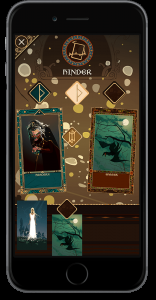 Print
Print  PDF
PDFEntrepreneur Alane Adams worries that kids don’t read enough. This, along with some nudging from her son, inspired her to put pen to paper and create the fantasy book series, The Legends of Orkney, based on Norse mythology. The series is full of magic and adventure in order to entice kids to read. But how do you motivate kids to want to open a book in the first place? The answer for Alane was to introduce her books to potential readers by extending the Legends of Orkney series into other platforms, starting with a mobile game called BattleKasters1. Alane set out targeting reading literacy, but she has created a training ground for essential 21st century literacies that draw from reading, gaming and constructing transmedia narratives.
Kids (and adults) don’t read as much traditional media as they used to. Common Sense Media, for example, published a 2014 research report showing that reading rates have dropped considerably among teens over the past 30 years and revealed a persistent racial and gender gap in reading levels.

Before you jump to conclusions and blame Facebook, however, there are lots of reasons why reading time has decreased. Teens have more structured obligations, such as schoolwork and after-school activities; in addition to the time they spend texting. Reading is moving online and to e-Readers and parental behaviors and home environment also matter a lot. But the success of the Hunger Games and Harry Potter also show that kids will read if they can find a story with characters they can relate to or that ignites their imagination. Thus when Alane’s son asked her to write something he’d like to read, both the storyteller and literacy advocate in her couldn’t resist. But recognizing the proliferation of interactive technology and gaming, Alane wanted to create other entry points to literacy. Game designer and Artifact Technology co-founder Brent Friedman partnered with Alane Adams Studios to extend the Legends of Orkney storyworld. Using Artifact Technology’s Mixby interfaceand an array of beacons (small Bluetooth transmitters that enable mobile content acquisition), they developed a ground-breaking spell-casting adventure game called BattleKasters which connects wirelessly with a player’s smartphone. The game is being launched at no charge at fan conventions this year. It combines live-action, alternate reality and augmented reality components around the social experience of play. Players can collect and share trading cards and artifacts found in the Legends of Orkney, meet characters and cast spells on fellow players while trying to close the stonefire portal in time. It is designed to capture the imaginations of both kids and their gaming parents and, ultimately, entice them to explore the book series.
Note: Yes, gamers grow up and have children. The average age of gamers in the US is about 30 years old and is about evenly split male/female (ESA, 2014). Thirty-nine percent of gamers in the US are 36 years old and over. According to Rob Salkowitz (2012), the age split for fan convention attendees is about 50/50 for over/under 30 years old. Parents often bring tween and teen children to share in the fun and big conventions like Comic-Con have childcare options.
The bridge between gaming and reading is an important one.
Parents who love gaming will pass on their enthusiasm just as book lovers do. Games are, after all, immersive narratives that unleash the imagination. Both platforms develop and reinforce literacy skills necessary for the 21st century. Transmedia extensions, while commonplace in Hollywood, are a critical approach for literacy projects because they provide multiple entry points at different literacy levels, targeting different strengths. It isn’t a question of one or the other. They both extend the imagination.
Psychologist Carol Dweck (2006) has shown that achievement isn’t about measurable ‘intelligence.’ It’s much more related to having a growth mindset—believing you can learn and improve. These are the critical factors in academic, career and overall life success and satisfaction.
Education and gaming scholar James Gee (2007) argues that game play develops a new set of literacies. His view of gaming’s benefits fits well with the development of a growth mindset, such as finding and adapting to new rule structures and capabilities as games ‘level up’, receiving accurate and frequent feedback to reaffirm progress and competencies, having a safe environment to experience risk and failure as well as victory, and creating collaborate, fluid environments.
The digital landscape has created a new and expanded set of literacies that require the ability to navigate, manage, communicate with and make sense of information of all kinds—text, image, video, sound and before long no doubt touch and smell—all of which have meaning that has to be curated, decoded and constructed (Rutledge, 2014).
So in spite of Alane’s initial focus on reading, she is casting her spell wider (BattleKasters pun intended) to facilitate a more profound and timely set of literacy skills.
References
Dweck, C. (2006). Mindset: The New Psychology of Success: Random House LLC.
ESA. (2014). Essential Facts About the Computer and Video Game Industry. Retrieved from http://www.theesa.com/wp-content/uploads/2014/10/ESA_EF_2014.pdf.
Gee, J. P. (2007). What Video Games Have to Teach Us About Learning and Literacy (Revised & Updated) (2nd ed.). New York: Palgrave Macmillan.
Rutledge, P. (2014). Transmedia Literacy: Expanding the Media Literacy Frontier. The Amplifier Magazine, Fall/Winter, from http://div46amplifier.com/2014/12/11/transmedia-literacy-expanding-the-media-literacy-frontier/.
Salkowitz, R. (2012). Comic-Con and the Business of Pop Culture: What the World’s Wildest Trade Show Can Tell Us About the Future of Entertainment. New York: McGraw Hill.
Footnotes:
1I’m using BattleKasters and Alane Adams to illustrate the importance of expanding the definition of literacy rather; it isn’t meant to be a shameless plug for Legends of Orkney. Full disclosure, however, I am on the Legends of Orkney advisory board.

